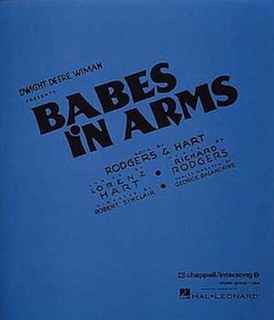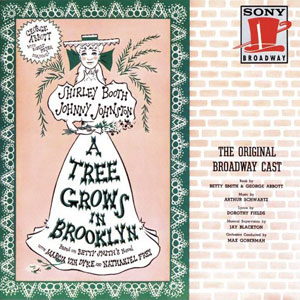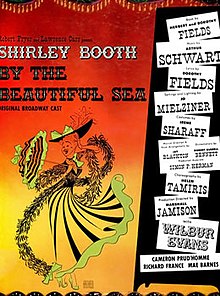
Paint Your Wagon is a Broadway musical comedy, with book and lyrics by Alan J. Lerner and music by Frederick Loewe. The story centers on a miner and his daughter and follows the lives and loves of the people in a mining camp in Gold Rush-era California. Popular songs from the show included "Wand'rin' Star", "I Talk to the Trees" and "They Call the Wind Maria".

Assassins is a musical with music and lyrics by Stephen Sondheim and a book by John Weidman, based on an original concept by Charles Gilbert Jr.

Richard Charles Rodgers was an American composer, known largely for his work in musical theater. With 43 Broadway musicals and over 900 songs to his credit, Rodgers was one of the most significant American composers of the 20th century, and his compositions had a significant impact on popular music.

Love Finds Andy Hardy is a 1938 American romantic comedy film that tells the story of a teenage boy who becomes entangled with three different girls all at the same time. It stars Mickey Rooney, Lewis Stone, Fay Holden, Cecilia Parker, Judy Garland, Lana Turner, Ann Rutherford, Mary Howard and Gene Reynolds.

Babes in Arms is a 1937 musical comedy with music by Richard Rodgers, lyrics by Lorenz Hart and book by Rodgers and Hart. It concerns a group of small-town Long Island teenagers who put on a show to avoid being sent to a work farm by the town sheriff when their actor parents go on the road for five months in an effort to earn some money by reviving vaudeville.

Shirley Mae Jones is an American actress and singer. In her six decades in show business, she has starred as wholesome characters in a number of musical films, such as Oklahoma! (1955), Carousel (1956), and The Music Man (1962). She won the Academy Award for Best Supporting Actress for playing a vengeful prostitute in Elmer Gantry (1960). She played the lead role of Shirley Partridge, the widowed mother of five children, in the musical situation-comedy television series The Partridge Family (1970–1974), which co-starred her real-life stepson, David Cassidy, son of Jack Cassidy.

June Havoc (born Ellen June Evangeline Hovick, was a Canadian American actress, dancer, writer, and stage director.

Shirley Booth was an American actress. One of only 24 performers to achieve the Triple Crown of Acting, Booth was the recipient of an Academy Award, two Primetime Emmy Awards and three Tony Awards.
Arthur Freed was an American lyricist and Hollywood film producer. He won the Academy Award for Best Picture twice, in 1951 for An American in Paris and in 1958 for Gigi. Both films were musicals. In addition, he produced and was also a co-lyricist for the film Singin' in the Rain.

Blood Brothers is a musical with book, lyrics, and music by Willy Russell. The story is a contemporary nature versus nurture plot, revolving around fraternal twins Mickey and Eddie, who were separated at birth, one subsequently being raised in a wealthy family, the other in a poor family. The different environments take the twins to opposite ends of the social spectrum, one becoming a councillor, and the other unemployed and in prison. They both fall in love with the same girl, causing a rift in their friendship and leading to the tragic death of both brothers. Russell says that his work was based on a one-act play that he read as a child "about two babies switched at birth ... it became the seed for Blood Brothers."

Of Thee I Sing is a musical with a score by George Gershwin, lyrics by Ira Gershwin and a book by George S. Kaufman and Morrie Ryskind. The musical lampoons American politics; the story concerns John P. Wintergreen, who runs for President of the United States on the "love" platform. When he falls in love with the sensible Mary Turner instead of Diana Devereaux, the beautiful pageant winner selected for him, he gets into political hot water.

The Most Happy Fella is a 1956 musical with a book, music, and lyrics by Frank Loesser. The story, about a romance between an older man and younger woman, is based on the 1924 play They Knew What They Wanted by Sidney Howard. The show is described by some theatre historians and critics as operatic. The original Broadway production ran for 14 months and it has enjoyed several revivals, including one staged by the New York City Opera.
Sugar Babies is a musical revue conceived by Ralph G. Allen and Harry Rigby, with music by Jimmy McHugh, lyrics by Dorothy Fields and Al Dubin and various others. The show is a tribute to the old burlesque era. First produced in 1979 on Broadway and running nearly three years, the revue attracted warm notices and was given subsequent touring productions.

George Albert "Georgie" Jessel was an American, actor, singer, songwriter, film producer, and illustrated song "model." He was famous in his lifetime as a multitalented comedic entertainer, achieving a level of recognition that transcended his limited roles in movies. He was widely known by his nickname, the "Toastmaster General of the United States," for his frequent role as the master of ceremonies at political and entertainment gatherings. Jessel originated the title role in the stage production of The Jazz Singer.

Fanny is a musical with a book by S. N. Behrman and Joshua Logan and music and lyrics by Harold Rome. A tale of love, secrets, and passion set in and around the old French port of Marseille, it is based on Marcel Pagnol's trilogy of works titled Marius (1929), Fanny (1931), and César (1936).

Babes in Arms is the 1939 American film version of the 1937 Broadway musical of the same title. Directed by Busby Berkeley, it stars Mickey Rooney and Judy Garland, and features Charles Winninger, Guy Kibbee, June Preisser, Grace Hayes, and Betty Jaynes. The film concerns a group of youngsters trying to put on a show to prove their vaudevillian parents wrong and make it to Broadway. The original Broadway script was significantly revamped, restructured, and rewritten to accommodate Hollywood's needs. Almost all of the Rodgers and Hart songs from the Broadway musical were discarded.

A Tree Grows in Brooklyn is a musical with a book by George Abbott and Betty Smith, lyrics by Dorothy Fields, and music by Arthur Schwartz.

Dearest Enemy is a musical with a book by Herbert Fields, lyrics by Lorenz Hart, and music by Richard Rodgers. This was the first of eight book musicals written by the songwriting team of Rodgers and Hart and writer Herbert Fields, and the first of more than two dozen Rodgers and Hart Broadway musicals. The musical takes place in 1776, during the American Revolutionary War, when Mary Lindley Murray detained British troops long enough in Manhattan to give George Washington time to move his vulnerable troops.

Winifred Elaine "Wynne" Gibson was an American actress of the 1930s.

Little Miss Broadway is a 1938 American musical drama film directed by Irving Cummings. The screenplay was written by Harry Tugend and Jack Yellen. The film stars Shirley Temple in a story about a theatrical boarding house and its occupants, and was originally titled Little Lady of Broadway. In 2009, the film was available on DVD and videocassette.


















